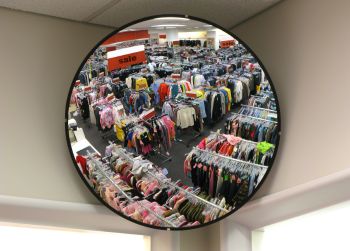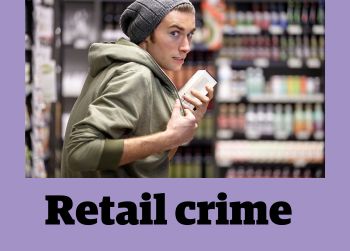Once upon a time, if you were caught stealing from a market stall or shop in England you risked a one way passage to the penal colonies of Australia.
In the 21st century the penalties for theft are less severe but retail crime continues to plague, and cost, Te-Whanganui-a-Tara/Wellington’s retail businesses.
Towards the end of 2023, in an interview with local retailer Mandy LaHatte of Indeja, she mentioned loss of stock from shelves. While Mandy was alert to tactics used by groups of young women who ‘lifted’ small items from shelves, she had also “… had clothing stolen from the models on the street [at the shop doorway]. I don’t want to have to be anticipating that. I have a business to run”.
Around the same time as we did that interview, local newspaper, The Post reported on an incident whereby a Featherston Street sushi retailer confronted someone stealing product placed near the doorway and ended up being physically assaulted.
A few weeks later the same paper reported a Miramar garden centre was broken into two nights in a row with a substantial amount of stock taken.
According to a 2023 Retail NZ crime report retail crime in New Zealand costs around $2.6 billion per annum.
Retail crime takes many forms and includes, but is not limited to, shoplifting, threatening behaviour, robbery, fraud (online, credit card etc) and cybercrime. It affects all retail business whether large chains or small independent businesses.
At the larger end of the scale, supermarket chain Woolworths NZ last year announced it was going to invest NZ$45 million over the next three years to increase security measures. This came after an increase of more than 800% in security issues alongside an increase of over 300% in thefts.
Meanwhile Foodstuffs NZ began trialling Facial Recognition technology (FRT) this month, in an attempt to reduce retail crime. “It follows 4719 incidents of retail crime reported across Foodstuffs stores in the last quarter of 2023, including 513 trespass breaches – up 52 percent on the previous quarter”.
Following a series of ramraids Michael Hill jewellery stores invested NZ$5 million in security including full time guards in some stores.
Increases in security measures and as well as increased insurance claims resulting in higher premiums for the retailer mean increases in overall product costs. While retailers initially absorb increased costs the high cost of theft to these businesses means they are having to pass some of the costs along to the consumers.
The most prevalent of retail crimes is shoplifting and the Retail NZ report showed that 82 percent of those surveyed had been affected by this form of theft.
Shoplifting has been recognised as a retail issue since sixteenth century England “…when shoplifters became so prevalent that retail merchants sought laws punishing those that stole their products.”
It is often said that shoplifting is a ‘victimless’ or petty crime. However, whether it is kids ‘nicking’ a chocolate bar from the local dairy as a dare or a gang stealing product to order, theft of stock hurts businesses big and small.
Again, The Post has given coverage to this in a recent article, while in her recent op-ed piece, Retail NZ CEO Carolyn Young outlined how retail crime “… presents an increasing health and safety risk to both employees and customers, as well as threatening the financial sustainability of retail businesses”.
While it is not the purpose of this blog to go into the reasons why people steal, it can be said that there is no ‘typical’ shoplifting offender and the reasons driving these behaviours are as varied and complex as the population.
In the UK, store theft has increased to a point whereby retailers are resorting to using dummy boxes of products, undercover security guards and body cameras on staff in an attempt to counter the rise in thefts. In Aotearoa stores are resorting to keeping ‘desirable’ products in locked cabinets, behind the counter or in the case of some high end products like handbags, linked together with security wires.

Retail NZ offers members advice and resources to combat retail crime along with benefits of sharing advice and experiences. They also advocate on behalf of members with government on issues like retail crime and the need for more protection for retailers.
In the Wellington CBD the Eyes On programme runs in conjunction with Wellington City Council, NZ Police and Wellington NZ and works with retailers to reduce store theft as well as enhancing safety for the local retail community.

Here are some steps a small retailer can undertake to counter stock shrinkage:
Conduct a physical security assessment of the premises
Consider and limit entrance and exit points to the store
Design a clean store layout ensuring display heights and arrangement don’t create blindspots
Install good lighting
Install security cameras, mirrors and/or security gates.
Advertise the security measures in place
Develop a loss prevention policy and train all staff on its use
Undertake loss prevention awareness and de-escalation training for all staff, including those who are part time and/or temporary.
Emphasise customer service – encouraging staff to acknowledge all customers as they enter the store has been shown to reduce shoplifting.
Introduce electronic tracking of stock
Keep desirable products out of easy access such as in locked cabinets or behind the counter
Network with neighbouring businesses
In the event of stock loss, Carolyn Young of Retail NZ encourages retailers to report the incident to the police, providing as much detail as possible. That way patterns are built up of the extent of the offending as well as profiles of recidivist offenders.
NZ Police operate an internal unit, National Retail Investigation Support Unit (NRISU) which “…partners with the retail sector and crime prevention organisations at a national level and works with Police staff at a district level to assist them to specifically target offenders causing the greatest harm to the retail sector, its staff, and customers.” There are also resources and advice available via their Retail Crime Prevention Hub page.
However at the end of the day, Carolyn Young counsels “Don’t put product ahead of wellbeing“. The health and safety of retailers and staff should always be paramount.
If you need more information please contact the Prosearch team at the library. We can help you find information across a range of perspectives and resources. All enquiries are treated in confidence.


